Articles by Inga Ulnicane
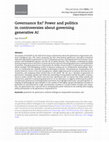
Ulnicane, I. (2024) Governance fix? Power and politics in controversies about governing generative AI, Policy and Society, puae022, https://doi.org/10.1093/polsoc/puae022, 2024
The launch of ChatGPT in late 2022 led to major controversies about the governance of generative ... more The launch of ChatGPT in late 2022 led to major controversies about the governance of generative artificial intelligence (AI). This article examines the first international governance and policy initiatives dedicated specifically to generative AI: the G7 Hiroshima process, the Organisation for Economic Cooperation and Development reports, and the UK AI Safety Summit. This analysis is informed by policy framing and governance literature, in particular by the work on technology governance and Responsible Innovation. Emerging governance of generative AI exhibits characteristics of polycentric governance, where multiple and overlapping centers of decision-making are in collaborative relationships. However, it is dominated by a limited number of developed countries. The governance of generative AI is mostly framed in terms of the risk management, largely neglecting issues of purpose and direction of innovation, and assigning rather limited roles to the public. We can see a "paradox of generative AI governance" emerging, namely, that while this technology is being widely used by the public, its governance is rather narrow. This article coins the term "governance fix" to capture this rather narrow and technocratic approach to governing generative AI. As an alternative, it suggests embracing the politics of polycentric governance and Responsible Innovation that highlight democratic and participatory coshaping of technology for social benefit. In the context of the highly unequal distribution of power in generative AI characterized by a high concentration of power in a small number of large tech companies, the government has a special role in reshaping the power imbalances by enabling wide-ranging public participation in the governance of generative AI.

Ulnicane, I. (2024) Intersectionality in Artificial Intelligence: Framing Concerns and Recommendations for Action. Social Inclusion, 12: 7543 https://doi.org/10.17645/si.7543, 2024
While artificial intelligence (AI) is often presented as a neutral tool, growing evidence suggest... more While artificial intelligence (AI) is often presented as a neutral tool, growing evidence suggests that it exacerbates gender, racial, and other biases leading to discrimination and marginalization. This study analyzes the emerging agenda on intersectionality in AI. It examines four high-profile reports dedicated to this topic to interrogate how they frame problems and outline recommendations to address inequalities. These four reports play an important role in putting problematic intersectionality issues on the political agenda of AI, which is typically dominated by questions about AI's potential social and economic benefits. The documents highlight the systemic nature of problems that operate like a negative feedback loop or vicious cycle with the diversity crisis in the AI workforce leading to the development of biased AI tools when a largely homogenous group of white male developers and tech founders build their own biases into AI systems. Typical examples include gender and racial biases embedded into voice assistants, humanoid robots, and hiring tools. The reports frame the diversity situation in AI as alarming, highlight that previous diversity initiatives have not worked, emphasize urgency, and call for a holistic approach that focuses not just on numbers but rather on culture, power, and opportunities to exert influence. While dedicated reports on intersectionality in AI provide a lot of depth, detail, and nuance on the topic, in the patriarchal system they are in danger of being pigeonholed as issues of relevance mainly for women and minorities rather than part of the core agenda.
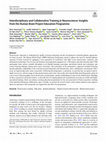
Geminiani, A., Kathrein, J., Yegenoglu, A., Vogel, F., Armendariz, M., Ben-Zion, Z., ... & Passecker, J. (2024). Interdisciplinary and Collaborative Training in Neuroscience: Insights from the Human Brain Project Education Programme. Neuroinformatics., 2024
Neuroscience education is challenged by rapidly evolving technology and the development of interd... more Neuroscience education is challenged by rapidly evolving technology and the development of interdisciplinary approaches for brain research. The Human Brain Project (HBP) Education Programme aimed to address the need for interdisciplinary expertise in brain research by equipping a new generation of researchers with skills across neuroscience, medicine, and information technology. Over its ten year duration, the programme engaged over 1,300 experts and attracted more than 5,500 participants from various scientific disciplines in its blended learning curriculum, specialised schools and workshops, and events fostering dialogue among early-career researchers. Key principles of the programme’s approach included fostering interdisciplinarity, adaptability to the evolving research landscape and infrastructure, and a collaborative environment with a focus on empowering early-career researchers. Following the programme’s conclusion, we provide here an analysis and in-depth view across a diverse range of educational formats and events. Our results show that the Education Programme achieved success in its wide geographic reach, the diversity of participants, and the establishment of transversal collaborations. Building on these experiences and achievements, we describe how leveraging digital tools and platforms provides accessible and highly specialised training, which can enhance existing education programmes for the next generation of brain researchers working in decentralised European collaborative spaces. Finally, we present the lessons learnt so that similar initiatives may improve upon our experience and incorporate our suggestions into their own programme.

Ulnicane, I. and Erkkilä, T. (2023) Politics and policy of Artificial Intelligence. Review of Policy Research, 40(5): 612-625. https://doi.org/10.1111/ropr.12574, 2023
While recent discussions about Artificial Intelligence (AI) as one of the most powerful technolog... more While recent discussions about Artificial Intelligence (AI) as one of the most powerful technologies of our times tend to portray it as a predominantly technical issue, it also has major social, political and cultural implications. So far these have been mostly studied from ethical, legal and economic perspectives, while politics and policy have received less attention. To address this gap, this special issue brings together nine research articles to advance the studies of politics and policy of AI by identifying emerging themes and setting out future research agenda. Diverse but complementary contributions in this special issue speak to five overarching themes: understanding the AI as co-shaped by technology and politics; highlighting the role of ideas in AI politics and policy; examining the distribution of power; interrogating the relationship between novel technology and continuity in politics and policy; and exploring interactions among developments at local, national, regional and global levels. This special issue demonstrates that AI policy is not an apolitical field that can be dealt with just by relying on knowledge and expertise but requires an open debate among alternative views, ideas, values and interests.

Ulnicane, I., & Aden, A. (2023) Power and politics in framing bias in Artificial Intelligence policy. Review of Policy Research, 40(5): 665-687. https://doi.org/10.1111/ropr.12567, 2023
Bias is a key issue in expert and public discussions about Artificial Intelligence (AI). While so... more Bias is a key issue in expert and public discussions about Artificial Intelligence (AI). While some hope that AI will help to eliminate human bias, others are concerned that AI will exacerbate it. To highlight political and power aspects of bias in AI, this contribution examines so far largely overlooked topic of framing of bias in AI policy. Among diverse approaches of diagnosing problems and suggesting prescriptions, we can distinguish two stylized framings of bias in AI policy—one more technical, another more social. Powerful technical framing suggests that AI can be a solution to human bias and can help to detect and eliminate it. It is challenged by an alternative social framing, which emphasizes the importance of social contexts, balance of power and structural inequalities. Technological frame sees simple technological fix as a way to deal with bias in AI. For the social frame, we suggest to approach bias in AI as a complex wicked problem, for which a broader strategy is needed involving diverse stakeholders and actions. The social framing of bias in AI considerably expands the legitimate understanding of bias and the scope of potential actions beyond technological fix. We argue that, in the context of AI policy, intersectional bias should not be perceived as a niche issue but rather be seen as a key to radically reimagine AI governance, power and politics in more participatory and inclusive ways.
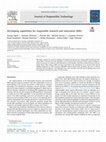
Ogoh, G., Akintoye, S., Eke, D., Farisco, M., Fernow, J., Grasenick, K., Guerrero, M., Rosemann, A., Salles, A. and Ulnicane, I. (2023) Developing Capabilities for Responsible Research and Innovation (RRI). Journal of Responsible Technology, 100065. https://doi.org/10.1016/j.jrt.2023.100065 , 2023
This paper examines the notion of capability development through the lens of Responsible Research... more This paper examines the notion of capability development through the lens of Responsible Research and Innovation (RRI). It describes how RRI capabilities can be promoted and developed through capacity-building activities by drawing on a reflection of the experiences of some members of the Ethics and Society team of the EUfunded Human Brain Project (HBP) who have contributed to the development of an extensive RRI capacity building programme for HBP researchers, EBRAINS research infrastructure developers and users, as well as interested external audiences. It also highlights some of the outcomes of the RRI capacity-building exercise and the challenge of assessing the impact of such activities.
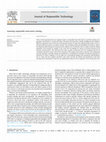
Stahl B, C.Aicardi, L.Brooks, P.Craigon, M.Cunden, S.Datta, M.De Heaver, S.De Saille, S.Dolby, L.Dowthwaite, D.Eke, S.Hughes, P.Keene, V.Kuh, V.Portillo, D.Shanley, M.Smallman, M.Smith, J.Stilgoe, I.Ulnicane, C.Wagner & H.Webb (2023) Assessing responsible innovation training, 2023
There is broad agreement that one important aspect of responsible innovation (RI) is to provide t... more There is broad agreement that one important aspect of responsible innovation (RI) is to provide training on its principles and practices to current and future researchers and innovators, notably including doctoral students. Much less agreement can be observed concerning the question of what this training should consist of, how it should be delivered and how it could be assessed. The increasing institutional embedding of RI leads to calls for the alignment of RI training with training in other subjects. One can therefore observe a push towards the official assessment of RI training, for example in the recent call for proposals for centres for doctoral training by UK Research and Innovation. This editorial article takes its point of departure from the recognition that the RI community will need to react to the call for assessment of RI training. It provides an overview of the background and open questions around RI training and assessment as a background of examples of RI training assessment at doctoral level. There is unlikely to be one right way of assessing RI training across institutions and disciplines, but we expect that the examples provided in this article can help RI scholars and practitioners orient their training and its assessment in ways that are academically viable as well as supportive of the overall aims of RI.

Ulnicane, I. (2022) Emerging technology for economic competitiveness or societal challenges? Framing purpose in Artificial Intelligence policy. Global Public Policy and Governance. 2(3): 326-345 https://doi.org/10.1007/s43508-022-00049-8, 2022
This study examines the policy discussions surrounding the purpose of the development and use of ... more This study examines the policy discussions surrounding the purpose of the development and use of an emerging technology. It applies the two stylized technology policy frames of economic growth and societal challenges to analyse framing of one of the key emerging technologies today-Artificial Intelligence (AI). It demonstrates that recent AI policy documents include both-economic growth as well as societal challenges-frames. While AI is a novel technology, its recent policy builds on traditional ideas about the role of technology in facilitating economic growth and competitiveness supported by well-known measures such as investment in research and highly skilled workforce. Additionally, AI policy draws on more recent frame on the contribution of technology to addressing societal challenges and the Sustainable Development Goals but presents AI as a technological solution to complex societal issues. While some interest in addressing both economic and social objectives in AI policy can be observed, the policy documents remain silent about their compatibility.
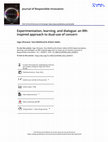
Ulnicane, I., T. Mahfoud & A. Salles (2023) Experimentation, learning, and dialogue: an RRI-inspired approach to dual-use of concern, Journal of Responsible Innovation 10(1): 2094071, https://doi.org/10.1080/23299460.2022.2094071, Jul 18, 2023
Responsible Research and Innovation is promoted by research funders and scientific communities as... more Responsible Research and Innovation is promoted by research funders and scientific communities as a way to place societal needs and values at the centre of research and innovation. In practice, however, legal compliance still tends to dominate the RRI agenda. In order to move beyond the dominance of legal compliance and address a broader societal agenda, this article argues that RRI requires: (1) a productive intertwining of research and practice; (2) the integration of anticipation, reflection, engagement, and action (AREA) in a nonlinear process; and (3) an experimental approach. Based on this framework, this article draws on our experience of developing and institutionalizing an RRI-inspired approach to address dual-use and misuse issues in the EU-funded Human Brain Project. Our experience suggests that the four dimensions of the AREA framework work better not as separate stages but rather being flexibly intertwined to enable experimentation, learning, and dialogue.
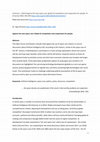
Ulnicane, I. (2023) Against the new space race: global AI competition and cooperation for people. AI & Society 38(2): 681-683 https://doi.org/10.1007/s00146-022-01423-0, 2023
This Open Forum contribution critically interrogates the use of space race rhetoric in current di... more This Open Forum contribution critically interrogates the use of space race rhetoric in current discussions about artificial intelligence (AI). According to this rhetoric, similar to the space race of the twentieth century, AI development is portrayed as a rivalry among superpowers where one country will win and reap major benefits, while others will be left behind. Using this rhetoric to frame AI development tends to prioritize narrow and short-term economic interests over broader and longer-term societal needs. Three particularly problematic aspects of using space race narrative in AI discussions are highlighted: first, perceiving technology development globally as a zero-sum game; second, pressuring governments to regulate less; and third, prioritising high technologies over social issues. This contribution invites to challenge underlying political assumptions of the AI space race discourse and to open up conversations about alternative futures.

Stahl, B.C., S.Akintoye, L.Bitsch, D.Eke, M.Farisco, K.Grasenick, M.Guerrero, W.Knight, T.Leach, S.Nyholm, G.Ogoh, A.Rosemann, A.Salles, J.Trattnig and I.Ulnicane (2021) ‘From RRI to Responsibility by Design’, Journal of Responsible Innovation 8(2): 175-198, 2021
Drawing on more than eight years working to implement Responsible Research and Innovation (RRI) i... more Drawing on more than eight years working to implement Responsible Research and Innovation (RRI) in the Human Brain Project, a large EU-funded research project that brings together neuroscience, computing, social sciences, and the humanities, and one of the largest investments in RRI in one project, this article offers insights on RRI and explores its possible future. We focus on the question of how RRI can have long-lasting impact and persist beyond the time horizon of funded projects. For this purpose, we suggest the concept of 'responsibility by design' which is intended to encapsulate the idea of embedding RRI in research and innovation in a way that makes it part of the fabric of the resulting outcomes, in our case, a distributed European Research Infrastructure.

Ulnicane, I., D. O. Eke, W. Knight, G. Ogoh & B. C. Stahl (2021) Good governance as a response to discontents? Déjà vu, or lessons for AI from other emerging technologies, Interdisciplinary Science Reviews, 46:1-2, 71-93, DOI: 10.1080/03080188.2020.1840220, 2021
Recent advances in Artificial Intelligence (AI) have led to intense debates about benefits and co... more Recent advances in Artificial Intelligence (AI) have led to intense debates about benefits and concerns associated with this powerful technology. These concerns and debates have similarities with developments in other emerging technologies characterized by prominent impacts and uncertainties. Against this background, this paper asks, What can AI governance, policy and ethics learn from other emerging technologies to address concerns and ensure that AI develops in a socially beneficial way? From recent literature on governance, policy and ethics of emerging technologies, six lessons are derived focusing on inclusive governance with balanced and transparent involvement of government, civil society and private sector; diverse roles of the state including mitigating risks, enabling public participation and mediating diverse interests; objectives of technology development prioritizing societal benefits; international collaboration supported by science diplomacy, as well as learning from computing ethics and Responsible Innovation.
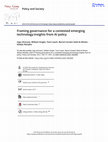
Ulnicane, I., W. Knight, T. Leach, B. C. Stahl and W.-G. Wanjiku. 2021. Framing governance for a contested emerging technology: insights from AI policy, Policy and Society 40(2): 158-177 https://doi.org/10.1080/14494035.2020.1855800, 2021
This paper examines how the governance in AI policy documents have
been framed as way to resolve ... more This paper examines how the governance in AI policy documents have
been framed as way to resolve public controversies surrounding AI. It
draws on the studies of governance of emerging technologies, the
concept of policy framing, and analysis of 49 recent policy documents
dedicated to AI which have been prepared in the context of technological
hype expecting fast advances of AI that will fundamentally change
economy and society. The hype about AI is accompanied by major
public controversy about positive and negative effects of AI. Against
the backdrop of this policy controversy, governance emerges as one of
the frames that diagnoses the problems and offers prescriptions.
Accordingly, the current governance characterized by oligopoly of
a small number of large companies is indicated as one of the reasons
for problems such as lack of consideration of societal needs and concerns. To address these problems, governance frame in AI policy
documents assigns more active and collaborative roles to the state
and society. Amid public controversies, the state is assigned the roles of
promoting and facilitating AI development while at the same time
being a guarantor of risk mitigation and enabler of societal engagement.
High expectations are assigned to public engagement with
multiple publics as a way to increase diversity, representation and
equality in AI development and use. While this governance frame
might have a normative appeal, it is not specific about addressing
some well-known challenges of the proposed governance mode
such as risks of capture by vested interests or difficulties to achieve
consensus.

Aicardi, C., S.Akintoye, B.T.Fothergill, M.Guerrero, G.Klinker, W.Knight, L.Klüver, Y.Morel, F.O.Morin, B.C.Stahl and I.Ulnicane (2020) Ethical and Social Aspects of Neurorobotics. Science and Engineering Ethics 26: 2533–2546 https://doi.org/10.1007/s11948-020-00248-8, 2020
The interdisciplinary field of neurorobotics looks to neuroscience to overcome the limitations of... more The interdisciplinary field of neurorobotics looks to neuroscience to overcome the limitations of modern robotics technology, to robotics to advance our understanding of the neural system's inner workings, and to information technology to develop tools that support those complementary endeavours. The development of these technologies is still at an early stage, which makes them an ideal candidate for proac-tive and anticipatory ethical reflection. This article explains the current state of neu-rorobotics development within the Human Brain Project, originating from a close collaboration between the scientific and technical experts who drive neurorobotics innovation, and the humanities and social sciences scholars who provide contextu-alising and reflective capabilities. This article discusses some of the ethical issues which can reasonably be expected. On this basis, the article explores possible gaps identified within this collaborative, ethical reflection that calls for attention to ensure that the development of neurorobotics is ethically sound and socially acceptable and desirable.
Frontiers in Human Neuroscience, 2019
The increasing use of information and communication technologies (ICTs) to help facilitate neuros... more The increasing use of information and communication technologies (ICTs) to help facilitate neuroscience adds a new level of complexity to the question of how ethical issues of such research can be identified and addressed. Current research ethics practice, based on ethics reviews by institutional review boards (IRB) and underpinned by ethical principlism, has been widely criticized. In this article, we develop an alternative way of approaching ethics in neuro-ICT research, based on discourse ethics, which implements Responsible Research and Innovation (RRI) through dialogues. We draw on our work in Ethics Support, using the Human Brain Project (HBP) as empirical evidence of the viability of this approach.

Ulnicane, I. (2016). 'Grand Challenges' concept: a return of the 'big ideas' in science, technology and innovation policy? International Journal of Foresight and Innovation Policy 11(1/2/3): 5-21. doi: http://dx.doi.org/10.1504/IJFIP.2016.078378, Aug 18, 2016
In recent years, the ‘Grand Challenges’ idea has become widely used in research and innovation po... more In recent years, the ‘Grand Challenges’ idea has become widely used in research and innovation policy around the world, shifting the focus to tackling global societal problems in areas such as energy, health and environment through boundary spanning collaborations. This paper traces origins and global diffusion of the concept and analyses it in the context of long-term development of science, technology and innovation policy. It argues that the content and organisational dimensions of the Grand Challenges concept represent both continuity and change in research and innovation policy: although the concept draws on traditional and more recent ideas about the social function of science and collaborations among heterogeneous actors, its focus on tackling large-scale global societal problems is novel. Scientific leaders and the private sector have played an important role in the emergence and diffusion of the concept, which was afterwards taken up by international organisations, national governments and research organisations.
Keywords: EU research and innovation policy; framing; global diffusion; ‘Grand Challenges’; policy ideas; policy initiatives; science, technology and innovation policy.
Link to the paper http://www.inderscience.com/info/inarticle.php?artid=78378
This paper is published in the Special Issue on Challenge-Oriented Research and Innovation: Concepts, Practices and Policies.

Ulnicane, I (2016) Research and innovation as sources of renewed growth? EU policy responses to the crisis. Journal of European Integration 38(3): 327-341 DOI:10.1080/07036337.2016.1140155, Mar 24, 2016
An important element of the EU policy discourse during times of crisis has been a call to invest ... more An important element of the EU policy discourse during times of crisis has been a call to invest more in research and innovation as sources of future growth. To study the effects of crisis in this policy area, this article draws on an analysis of expert interviews, policy documents and relevant literature. It argues that the crisis has led to incremental and path-dependent changes in EU policy instruments and priorities. To respond to the crisis, EU research and innovation policy has focused on two main issues. Firstly, it has aimed to facilitate structural reforms and to increase the level, quality and efficiency of public and private investments in research and innovation at the national level. Secondly, the EU has increased its own research and innovation funding. These decisions have involved compromises between the European Commission, the European Parliament, the Council and stakeholder organisations.
Keywords: Economic crisis, research and innovation policy, European Union, policy change
This article is part of a special issue ‘EU Policies in Times of Crisis’ that compare changes in 9 policy areas (e.g. energy, migration, and health).

Ulnicane, I. (2015). Why do international research collaborations last? Virtuous circle of feedback loops, continuity and renewal. Science and Public Policy, 42(4), 433-447. doi: 10.1093/scipol/scu060, Aug 1, 2015
It is often argued that the unintended consequences of science policy transformation over the las... more It is often argued that the unintended consequences of science policy transformation over the last 50 years—increased role of fixed-term project funding, evaluation and temporary contracts—are short-termism, fragmentation and limited freedom to choose research topics and collaborators. This paper focuses on a phenomenon that should be highly unlikely in this context: long-term international research collaborations lasting over 10 and 20 years which remain creative and productive. To shed light on the little studied topic of why and how long-term international research collaborations evolve, the paper develops a mid-range theory from multiple longitudinal case studies. It suggests that long-term collaborations combining formal and informal interactions operate as virtuous circles whereas earlier results ensure feedback loops and thematic and organisational continuity, but renewal is crucial. The emergent theory is built from multiple data sources and methods analysing international collaborations in the emerging field of nanosciences in Europe.
Keywords: Long-term collaboration; international collaboration; informal collaboration; science policy; project funding.
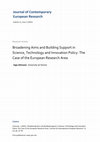
Ulnicane, I. (2015) Broadening aims and building support in science, technology and innovation policy: The case of the European Research Area. Journal of Contemporary European Research 11 (1): 31-49.
The aim of this article is to analyse the evolution of the ideational framework of the most ambit... more The aim of this article is to analyse the evolution of the ideational framework of the most ambitious initiative in supranational research governance so far – the European Research Area (ERA), launched by the European Commission in 2000. In order to do so, the ERA initiative is analysed against the background of the long-term development of the science, technology and innovation policy ideas. The analysis reveals that over the course of 14 years, the policy aims of, and support for, the ERA initiative have considerably broadened. While economic competitiveness goals initially dominated the Commission’s initiative to launch the ERA, the initiative has gradually expanded towards social and scientific aims as well as stronger involvement of member states and stakeholders. Recent “big ideas” of excellent science and Grand Challenges help increase support for the ERA initiative among the research community and society. In the broadened ERA ideational frame, diverse aims of scientific freedom, societal relevance and economic competitiveness co-exist but attention to the relationships between them has been limited. Further exploration and conceptualization of the relationships between diverse policy ideas is an important challenge for future research policy studies and practice.

Chou, M.-H. and Ulnicane, I. (2015) New Horizons in the Europe of Knowledge. Journal of Contemporary European Research 11 (1): 4-15.
This editorial introduces the notion of the Europe of Knowledge and places it in the European int... more This editorial introduces the notion of the Europe of Knowledge and places it in the European integration research agenda. We first describe what the concept means before suggesting how to approach the Europe of Knowledge as a new case for investigating European integration dynamics. This discussion revolves around the evolution of policy developments in research and higher education to show how knowledge policies are compound and manifest distinct dimensions of differentiated integration and experimentation, both fruitful theoretical research agendas. We then summarise the articles to show the respective Europe of Knowledge themes they highlight. We conclude by considering how the Europe of Knowledge in the making encourages testing established empirical and analytical assumptions about European integration and experimenting with emerging ideas about regional cooperation from around the world.

Uploads
Articles by Inga Ulnicane
been framed as way to resolve public controversies surrounding AI. It
draws on the studies of governance of emerging technologies, the
concept of policy framing, and analysis of 49 recent policy documents
dedicated to AI which have been prepared in the context of technological
hype expecting fast advances of AI that will fundamentally change
economy and society. The hype about AI is accompanied by major
public controversy about positive and negative effects of AI. Against
the backdrop of this policy controversy, governance emerges as one of
the frames that diagnoses the problems and offers prescriptions.
Accordingly, the current governance characterized by oligopoly of
a small number of large companies is indicated as one of the reasons
for problems such as lack of consideration of societal needs and concerns. To address these problems, governance frame in AI policy
documents assigns more active and collaborative roles to the state
and society. Amid public controversies, the state is assigned the roles of
promoting and facilitating AI development while at the same time
being a guarantor of risk mitigation and enabler of societal engagement.
High expectations are assigned to public engagement with
multiple publics as a way to increase diversity, representation and
equality in AI development and use. While this governance frame
might have a normative appeal, it is not specific about addressing
some well-known challenges of the proposed governance mode
such as risks of capture by vested interests or difficulties to achieve
consensus.
Keywords: EU research and innovation policy; framing; global diffusion; ‘Grand Challenges’; policy ideas; policy initiatives; science, technology and innovation policy.
Link to the paper http://www.inderscience.com/info/inarticle.php?artid=78378
This paper is published in the Special Issue on Challenge-Oriented Research and Innovation: Concepts, Practices and Policies.
Keywords: Economic crisis, research and innovation policy, European Union, policy change
This article is part of a special issue ‘EU Policies in Times of Crisis’ that compare changes in 9 policy areas (e.g. energy, migration, and health).
Keywords: Long-term collaboration; international collaboration; informal collaboration; science policy; project funding.
been framed as way to resolve public controversies surrounding AI. It
draws on the studies of governance of emerging technologies, the
concept of policy framing, and analysis of 49 recent policy documents
dedicated to AI which have been prepared in the context of technological
hype expecting fast advances of AI that will fundamentally change
economy and society. The hype about AI is accompanied by major
public controversy about positive and negative effects of AI. Against
the backdrop of this policy controversy, governance emerges as one of
the frames that diagnoses the problems and offers prescriptions.
Accordingly, the current governance characterized by oligopoly of
a small number of large companies is indicated as one of the reasons
for problems such as lack of consideration of societal needs and concerns. To address these problems, governance frame in AI policy
documents assigns more active and collaborative roles to the state
and society. Amid public controversies, the state is assigned the roles of
promoting and facilitating AI development while at the same time
being a guarantor of risk mitigation and enabler of societal engagement.
High expectations are assigned to public engagement with
multiple publics as a way to increase diversity, representation and
equality in AI development and use. While this governance frame
might have a normative appeal, it is not specific about addressing
some well-known challenges of the proposed governance mode
such as risks of capture by vested interests or difficulties to achieve
consensus.
Keywords: EU research and innovation policy; framing; global diffusion; ‘Grand Challenges’; policy ideas; policy initiatives; science, technology and innovation policy.
Link to the paper http://www.inderscience.com/info/inarticle.php?artid=78378
This paper is published in the Special Issue on Challenge-Oriented Research and Innovation: Concepts, Practices and Policies.
Keywords: Economic crisis, research and innovation policy, European Union, policy change
This article is part of a special issue ‘EU Policies in Times of Crisis’ that compare changes in 9 policy areas (e.g. energy, migration, and health).
Keywords: Long-term collaboration; international collaboration; informal collaboration; science policy; project funding.
In this context, the Thesis undertakes multiple longitudinal in-depth case studies to obtain evidence of institute governance and other factors influencing the emergence, evolution and results of international collaborations at “grass-root” level. Multiple data sources and research methods are used to build a typological theory from seven case studies. Publication, citation, organisational and CV data together with 61 interviews with researchers in 31 leading nano S&T institutes in Germany, the Netherlands, France, Belgium and the United Kingdom are analysed.
The findings reveal that institute governance characteristics, such as autonomy, rich communicative and collaborative environment, open organisational culture, support for international mobility and recruitment and availability of diverse funding sources, facilitate productive and creative international collaborations, supporting initiatives of researchers and self-organisation processes of the scientific community.
The Thesis develops a typological theory of the influence of institute governance on international research collaboration in nano S&T in Europe, specifying how three ideal types of institute governance with diverse missions, reward systems, collaborative and communicative environment, mobility and funding structures - ‘exploratory’, ‘industrially relevant’ and ‘catch-all’ - relate to specific modes of international research collaboration. While collaboration among institutes with diverse types of governance can be beneficial due to complementarities, it can also increase the costs of collaboration as their institutional differences have to be reconciled.
Why is taxpayers’ money being invested in it? Why are elected officials supporting its development and use? Why is so much time and effort spent on discussing the details of future AI regulation? What is the overarching goal to which all these activities aim to contribute? Whose interests, values and norms does this overarching goal represent?
This is an Open Access publication and the chapter can be freely downloaded here https://tandfbis.s3-us-west-2.amazonaws.com/rt-files/docs/Open+Access+Chapters/9780367368814_oachapter11.pdf
Since the re-establishment of Latvia’s independence in 1991, its higher education has undergone major transformations including modernization, internationalization and joining the European Union in 2004. Latvia has a population of two million and a territory of 64,573 square kilometres. After the establishment of independence in 1918, its main university, the University of Latvia, was established in 1919. It is estimated that after the annexation of Latvia to the Soviet Union in 1940, approximately 60% of scientists fled to the West, creating a considerable knowledge diaspora (Adamsone-Fiskovica et al., 2011).
Since 1990, the higher education sector has expanded from 10 public and 2 private higher education institutions to 17 public and 15 private higher education institutions in 2016. The majority of students study in public higher education institutions, which had 56,788 students in 2016, while private institutions attracted 16,002 students.
KEYWORDS Economic crisis; research and innovation policy; European Union; policy change
This book was originally published as a special issue of the Journal of European Integration, and this chapter initially appeared as article in this special issue: Ulnicane, I. (2016). Research and Innovation as Sources of Renewed Growth? EU Policy Responses to the Crisis. Journal of European Integration, 38(3), 327-341. doi: 10.1080/07036337.2016.1140155
More informatiomation about the book available at https://www.routledge.com/EU-Policies-in-Times-of-Crisis/Falkner/p/book/9781138283749
important and rapidly evolving policy domain on the global political agenda: knowledge policies.
Knowledge policies such as research and higher education remain under-examined issue areas in
mainstream European studies. Yet their centrality to the governance of academic life, economic
growth, market positioning, innovation capacity in Europe and beyond have only grown in significance
throughout the last decade. Hence, to work in academe and to understand Europe, it is essential to
know the Europe of Knowledge in the making.
This editorial introduces the notion of the Europe of Knowledge and places it in the European
integration research agenda. We first describe what the concept means before suggesting how to
approach the Europe of Knowledge as a new case for investigating European integration dynamics.
This discussion revolves around the evolution of policy developments in research and higher education
to show how knowledge policies are compound and manifest distinct dimensions of differentiated
integration and experimentation, both fruitful theoretical research agendas. We then summarise the
articles to show the respective Europe of Knowledge themes they highlight. We conclude by
considering how the Europe of Knowledge in the making encourages testing established empirical and
analytical assumptions about European integration and experimenting with emerging ideas about
regional cooperation from around the world.
Video on YouTube here https://www.youtube.com/watch?v=3Ds-WWAXC6c
Recording of this talk is available here https://mediacentral.ucl.ac.uk/Play/62796
Today ‘Grand Challenges’ has become one of the key concepts in research and innovation policy emphasizing that research and innovation has to address major social and economic problems in the fields of energy, health and environment (Ulnicane, 2016). Strategies and funding schemes to address ‘Grand Challenges’ in research and innovation has been launched by national governments, international organizations, private foundations, scientific societies, and universities. Some well-known examples include the Grand Challenges in Health initiative launched by the Gates Foundation in 2003, the 2009 Lund declaration calling for European research policy to focus on Grand Challenges of our time, and the EU Horizon 2020 program setting societal challenges as one of the three priorities along with excellent science and industrial leadership.
This paper analyses the implication of ‘Grand Challenges’ concept for research and innovation governance. What governance arrangements have been developed to support research and innovation addressing Grand Challenges? Which actors and institutions are involved? How research and innovation addressing Grand Challenges are funded and evaluated? Does the focus on Grand Challenges lead to major changes in established research and innovation governance? To answer these questions, the paper reviews the existing initiatives to support research and innovation addressing ‘Grand Challenges’ launched during the last 12 years by national governments (US, Canada, Netherlands), international organizations (OECD, EU), private sector (Gates Foundation), scientific societies (National Academy of Engineering, Royal Society), and universities and research institutes (University College London, Princeton University, Research Center Jülich). In particular, EU research and innovation policy initiatives for tackling Grand Challenges (Joint Technology Initiatives, Joint Programming Initiatives, European Innovation Partnerships, and Knowledge and Innovation Communities) are analyzed.
Emerging research and innovation governance arrangements addressing Grand Challenges typically have several common features: in order to address real-world problems, they aim to bring together heterogeneous actors in inter- and transdisciplinary collaborations. However, there are also important differences in terms of the scope of initiatives (from local to global), actors involved (e.g., if and how business and civil society are involved), and policy prescriptions (topics to be addressed and targets to be reached). There are also a number of open questions including how to address cross-border challenges (beyond EU initiatives) and how to evaluate these initiatives which often have very broad social and economic aims.
Ulnicane, I. (2016). 'Grand Challenges' concept: a return of the 'big ideas' in science, technology and innovation policy? International Journal of Foresight and Innovation Policy, 11(1-3), 5-21. doi:http://dx.doi.org/10.1504/IJFIP.2016.078378
My review of the book 'Towards European Science: Dynamics and Policy of an Evolving European Research Space', edited by Linda Wedlin and Maria Nedeva, Edward Elgar, Cheltenahm, UK, 2015, 216 pages, GBP£75 (hardback), ISBN 9781782545507.
The panel invites theoretically informed and empirically rich submissions investigating these and others questions related to the politics of big science and research infrastructures from diverse disciplinary and methodological backgrounds including perspectives from Political Science, European Studies, International Relations, legal studies, sociology of science, organizational studies, Science and Technology Studies, research and innovation policy studies, history and economics. Contributions covering diverse empirical cases from traditional laboratories in physical sciences to new digital collaborations in humanities at national and international levels are sought.
If you would like to participate in the panel, please contact Inga Ulnicane
• What new challenges does the rise of populism present to policies of knowledge, technology and innovation which traditionally have been seen as technocratic fields?
• What roles does scientific expertise play in the age of alternative facts? • Can contemporary knowledge and innovation policy frames and paradigms (e.g., Grand challenges and impact) contribute to bridging the perceived separation between 'elite' and 'people' that is at the core of populist ideology?
• What does the rise of populism mean for social contract of science and legitimacy of continuous public support for knowledge and innovation policies?
• Does the rise of populism request revisiting existing or establishing new forums for engagement with society, values and ideologies in knowledge and innovation policies?
• What impact does recent political focus on strengthening national borders have on this field which for centuries have benefited from global flow of knowledge, technologies and people?
• Has the existing knowledge and innovation agenda unintentionally contributed to the causes of populism? Can revised knowledge and innovation policies contribute to solutions?
This is a tentative and not exhaustive list of questions to explore politics and policies of knowledge and innovation against the backdrop of rising populism around the world. This panel invites innovative theoretical and empirical contributions exploring and making sense of changes in knowledge and innovation policies in times of populism. In particular, interdisciplinary contributions combining insights from studies of populism, knowledge and innovation policy studies, Science and Technology Studies, expertise, public engagement and other relevant fields are welcome.